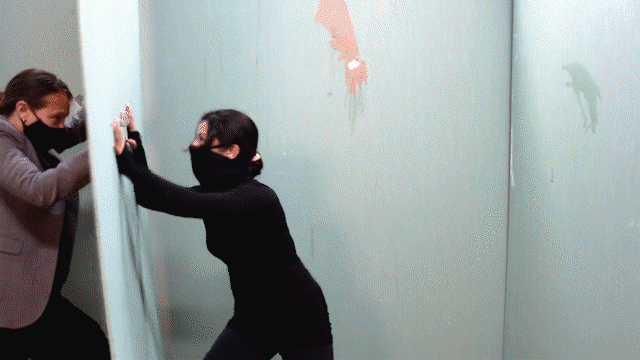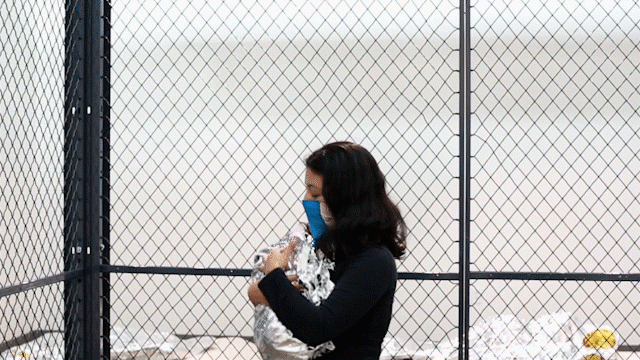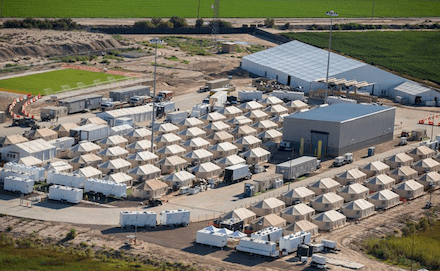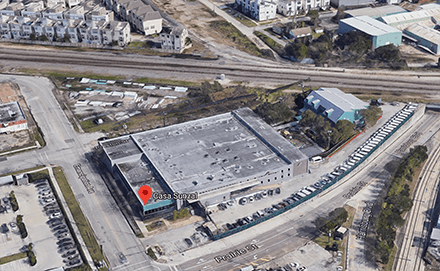YOUTH "CAMP"
1. View photos of the exhibition (use arrows or click/tap)
2. Watch the video component
The above video contains text excerpted from the Voice of Witness book,
Solito, Solita: Crossing Borders with Youth Refugees from Central America compiled and edited by Jonathan Freedman and Steven Mayers.
Solito, Solita: Crossing Borders with Youth Refugees from Central America compiled and edited by Jonathan Freedman and Steven Mayers.
“After two months, my name was called... I’d become an adult, so I couldn’t stay in youth detention any longer.”
“Después de dos meses, llamaron mi nombre... me convertí en un adulto, así que ya no podía quedarme en detención juvenil."
“Después de dos meses, llamaron mi nombre... me convertí en un adulto, así que ya no podía quedarme en detención juvenil."
Unaccompanied minor, Solito, Solita
3. Read the essay component
No immigration-related issue has reached the level of national attention as the “zero-tolerance” child separation policy of Donald Trump. However, the recent rise in unaccompanied minors goes back generations starting in the 1980s after the Reagan administration funded guerilla warfare against emerging socialist democracies in Central America, leaving a long legacy of inter-community violence, family trauma, and state governments that are unable to care for and protect their citizens, including children, from the power of extra-state gangs.
Meanwhile, the US treatment of child migrants has shifted quickly in the past 30 years. In the 90s, Immigration and Naturalization Services held minors in prison-like juvenile detention facilities. In 2003, this responsibility shifted to the Office of Refugee Resettlement, which created a small network of immigrant youth shelters. In 2008, the Trafficking Victims Protection Reauthorization Act of 2008 changed policy again, allowing CBP to deport most Mexican minors while “referring” unaccompanied minors from “non-contiguous” countries to ORR. Coupled with rising instability in Central America, this policy helped to create a new landscape for child migration to the US.
Is there a “crisis”? The numbers have changed. In 2012, CBP referred 13,600 minors to ORR; in 2014, it referred 24,000 minors, and in 2018, that number reached 49,000. However, 50,000 or even 100,000 unaccompanied minors is not a “crisis.” The US is capable of integrating thousands of children every year if it simply expanded the shelter capacity of Health and Human Services and ORR and funded non-profits committed to doing the work.
However, the Trump administration created another crisis in 2018, an “accompanied minor” crisis, by charging parents traveling with their children with immigration violations and taking away their children. While the policy officially lasted for 6 weeks, both Democratic and Republican administrations continue to “deal” with “accompanied minors” by either incarcerating parents and children in “family” immigrant prisons or releasing the child but detaining or deporting the parent.
Out of the 2,000 children that were torn apart from their parents in 2018,
506 remain separated after years of ICE negligence even when taken to court. Migrant youth, however, continue to spend days and sometimes weeks in “ice boxes” before being transferred to youth facilities, facilities like Casa Sunzal on Emancipation Avenue in Houston, where they wait to find a sponsor, but where they can only stay until they turn 18. In practice, it is not so easy to separate the migrant child from the migrant adult either because child migrants eventually become adults or because children often travel with their parents. For that reason, we cannot abolish “kids in cages” until we end immigrant detention. We also cannot end “family separation” until we abolish deportation.
Visions From The Inside and DYKWCA (Do You Know Where the Children Are?) have also addressed the issue of parent/child separation and child immigrant detention.
Meanwhile, the US treatment of child migrants has shifted quickly in the past 30 years. In the 90s, Immigration and Naturalization Services held minors in prison-like juvenile detention facilities. In 2003, this responsibility shifted to the Office of Refugee Resettlement, which created a small network of immigrant youth shelters. In 2008, the Trafficking Victims Protection Reauthorization Act of 2008 changed policy again, allowing CBP to deport most Mexican minors while “referring” unaccompanied minors from “non-contiguous” countries to ORR. Coupled with rising instability in Central America, this policy helped to create a new landscape for child migration to the US.
Is there a “crisis”? The numbers have changed. In 2012, CBP referred 13,600 minors to ORR; in 2014, it referred 24,000 minors, and in 2018, that number reached 49,000. However, 50,000 or even 100,000 unaccompanied minors is not a “crisis.” The US is capable of integrating thousands of children every year if it simply expanded the shelter capacity of Health and Human Services and ORR and funded non-profits committed to doing the work.
However, the Trump administration created another crisis in 2018, an “accompanied minor” crisis, by charging parents traveling with their children with immigration violations and taking away their children. While the policy officially lasted for 6 weeks, both Democratic and Republican administrations continue to “deal” with “accompanied minors” by either incarcerating parents and children in “family” immigrant prisons or releasing the child but detaining or deporting the parent.
Out of the 2,000 children that were torn apart from their parents in 2018,
506 remain separated after years of ICE negligence even when taken to court. Migrant youth, however, continue to spend days and sometimes weeks in “ice boxes” before being transferred to youth facilities, facilities like Casa Sunzal on Emancipation Avenue in Houston, where they wait to find a sponsor, but where they can only stay until they turn 18. In practice, it is not so easy to separate the migrant child from the migrant adult either because child migrants eventually become adults or because children often travel with their parents. For that reason, we cannot abolish “kids in cages” until we end immigrant detention. We also cannot end “family separation” until we abolish deportation.
Visions From The Inside and DYKWCA (Do You Know Where the Children Are?) have also addressed the issue of parent/child separation and child immigrant detention.
4. See the performance component
In December 2020, at the height of the COVID-19 pandemic, Sin Huellas members installed DETENTION NATION at Elgin Street Studios. In the space created, an ensemble of performers created the following Performance GIFs.

"ICE Lawyer Begins The Work Day"


"Asylum Application (Form I-589)"

"Shh"

"Braiding Hair"

"Come Here"
The videos and images in this installation space are based on letters and stories gathered from
the immigrant youth prisons listed below.
 Tornillo Influx Facility
Tornillo Influx FacilityTornillo, TX
Operated by Baptist Child and Family Services
Closed with plans to re-open as an adult facility



